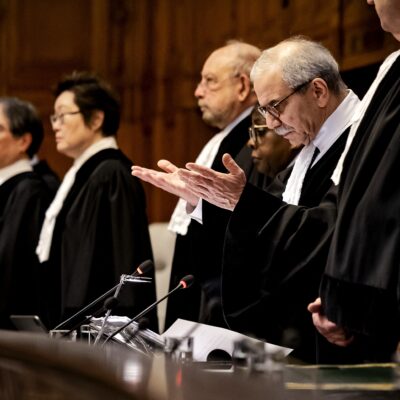House Foreign Affairs Committee approves bill seeking review of U.S.-South Africa relationship
The legislation is a response to the African nation’s growing relationships with Iran, Russia, China and Iran and its genocide case against Israel at the International Court of Justice

PHILL MAGAKOE/AFP via Getty Images
South African President Cyril Ramaphosa delivers his opening remarks during the Second Session of the South Africa-Ghana Bi-National Commission with Ghana's President Nana Akufo-Addo (not seen) at the Department of International Relations and Cooperation's OR Tambo Building in Pretoria on March 12, 2024.
The House Foreign Affairs Committee on Thursday approved a bill calling for a re-assessment of the U.S. relationship with South Africa in light of Pretoria’s growing relationships with Iran, Russia and China and its genocide case against Israel at the International Court of Justice.
The bill passed by a 36-13 vote, with 10 Democrats — Reps. Brad Sherman (D-CA), Gerry Connolly (D-VA), Bill Keating (D-MA), Ted Lieu (D-CA), Dean Phillips (D-MN), Kathy Manning (D-NC), Greg Stanton (D-AZ), Jared Moskowitz (D-FL), Jim Costa (D-CA) and Brad Schneider (D-IL) — voting in support.
During the debate on Wednesday, Rep. John James (R-MI), the bill’s lead sponsor, accused South Africa of moving away from its traditional nonaligned stance in foreign policy, instead showing “consistent and overt anti-Israel sentiment in the wake of the devastating Oct. 7 attacks.”
“Actions have consequences, and the American people have options,” James added, while emphasizing that the bill would only mandate a review, not any specific changes. “The only way that would be threatening is if you are actually undermining the United States and our partnership.”
South Africa’s minister of international relations and cooperation, visiting Washington this week, had claimed the legislation is coercive and anti-democratic.
Foreign Affairs Ranking Member Rep. Greg Meeks (D-NY) said he opposed the legislation, describing South Africa as a critical partner and arguing that the U.S. needs to work to strengthen, not weaken, its relationship with the country.
“The United States can offer positive choices to Africans as they determine their own future,” Meeks said. “We don’t get to impose our ideas, but we should make a compelling case for why it makes sense to partner with the United States and work together to achieve shared interests.”
He further framed the legislation as duplicative and unnecessary, given that the U.S.-South Africa relationship already undergoes an annual review under pre-existing legislation.
Rep. Scott Perry (R-PA) introduced an amendment that would have cut off aid to South Africa until at least a year after the report is issued. James pushed back, arguing that such a cut would penalize the South African people but have little impact on South Africa’s government. The amendment failed by voice vote.
Orde Kittrie, a senior fellow at the Foundation for Defense of Democracies, told JI that the key impact of the bill is that it would functionally require the administration to re-assess South Africa’s eligibility for a program allowing it to send $3 billion in exports to the U.S. duty-free each year “and thus brings the [African National Congress]-led South African government significantly closer to paying a large price… for its hostile foreign policy.”
Kittrie added that South Africa has received “far more [lenient]” treatment than other states engaging in similar behavior. He predicted that the administration will likely also face pressure to impose corruption sanctions on individual South African officials.










